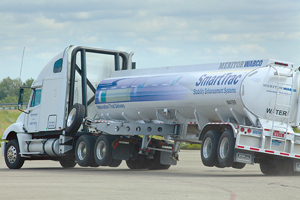NHTSA Proposes Stability-Control Mandate for Heavy Vehicles

Electronic stability-control systems would be required on all new heavy trucks and buses under a regulation proposed by the National Highway Traffic Safety Administration, which estimates it could prevent up to 2,329 crashes per year.
NHTSA said Wednesday that elecronic stability control, or ESC, is standard on about 26% of trucks and 80% of buses, uses engine torque control and automatic braking to prevent rollovers and losses of control.
“Today’s proposal is a major step forward to improving the safety of large commercial trucks, motorcoaches and other large buses,” Department of Transportation Secretary Ray LaHood said in a statement announcing the proposal.
The technology is already required on cars and light-duty trucks beginning with the 2012 model year, NHTSA Administrator David Strickland said in the statement. NHTSA is part of DOT.
“Now, we’re expanding our efforts to require stability enhancing technology on the many large trucks, motorcoaches and other large buses on our roadways,” Strickland said.
The average cost of ESC is $1,160 per vehicle, and the rule would cost $113.6 million to implement, NHTSA said, adding that the economic benefits would be $228 million to $310 million.
NHTSA said it expects to publish the proposal in the Federal Register soon, after which will start a 90-day public comment period.
NHTSA has posted the stability-control proposal on its website (190-pp. PDF document)

